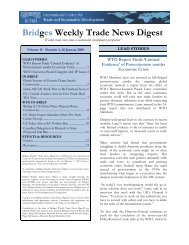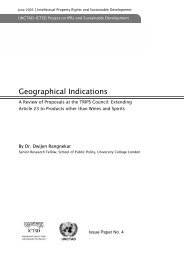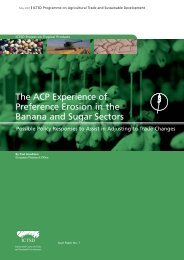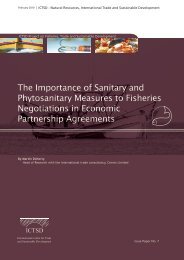Intellectual Property and Competition Law - IPRsonline.org
Intellectual Property and Competition Law - IPRsonline.org
Intellectual Property and Competition Law - IPRsonline.org
Create successful ePaper yourself
Turn your PDF publications into a flip-book with our unique Google optimized e-Paper software.
ICTSD Programme on IPRs <strong>and</strong> Sustainable DevelopmentviiForeword<strong>Intellectual</strong> <strong>Property</strong> <strong>and</strong> <strong>Competition</strong> <strong>Law</strong> is one further contribution of the ICTSD Programmeon <strong>Intellectual</strong> <strong>Property</strong> Rights <strong>and</strong> Sustainable Development to a better underst<strong>and</strong>ing of theproper role of intellectual property in a knowledge-based economy. The objective of the studyis to generate <strong>and</strong> increase underst<strong>and</strong>ing of the relationship between intellectual property (IP)<strong>and</strong> competition law <strong>and</strong> policy. The study explores a number of issues that could be relevantto developing countries in addressing the interface between these two disciplines where theunderst<strong>and</strong>ing of law <strong>and</strong> economics poses unique analytical challenges to policy-makers.As stressed in the study, the relationship between intellectual property <strong>and</strong> disciplines regulatingcompetition has attracted growing attention, particularly as a result of the expansion <strong>and</strong>strengthening of IP protection at the global scale. While IP law deliberately subjects intellectualassets to the exclusive control of right owners, competition law seeks to avoid market barriers<strong>and</strong> benefit consumers by encouraging competition among a multiplicity of suppliers of goods,services <strong>and</strong> technologies. Such challenges are particularly complex in developing countries, themajority of which have little or no tradition in the application of competition law <strong>and</strong> policies. Infact, in most of these countries intellectual property rights have been exp<strong>and</strong>ed <strong>and</strong> strengthenedin the absence of an operative body of competition law, in contrast to developed countries wherethe introduction of higher levels of IP protection has taken place in normative contexts thatprovide strong defences against anti-competitive practices.This study commissioned to Professor Carlos Correa (University of Buenos Aires), notes that theTRIPS Agreement (Article 40) specifically provides for the possibility of regulating anticompetitivepractices in licensing agreements. As highlighted in the paper, this is crucial to ensure the rightbalance between competition <strong>and</strong> the protection of intellectual property rights (IPRs). However,it does not specifically address this issue, as there is abundant literature on national experienceson this matter, as well as on the interpretation of the TRIPS Agreement <strong>and</strong> the legal approachesthat developing countries may adopt. The paper, on the contrary, explores a number of issueswhere not much work has yet been done in developing countries but that could be of relevancein tackling the interface between IP <strong>and</strong> competition policies. Notably, the paper deals withsome competition law issues specifically relating to technology markets, as distinct from productor service markets. It thus discusses the extent to which the refusal to license an intellectualproperty right to a third party may be deemed anti-competitive. The paper considers, further,anti-competitive situations arising from the acquisition <strong>and</strong> enforcement of intellectual propertyrights. The use of compulsory licences to remedy anti-competitive practices is also examinedtogether with a number of state interventions that determine key aspects of their competitionpolicies.The premise of ICTSD’s work in this field, together with its joint project with UNCTAD, is basedon the underst<strong>and</strong>ing that IPRs have never been more economically <strong>and</strong> politically important– or controversial – than they are today. Patents, copyrights, trademarks, industrial designs,integrated circuits <strong>and</strong> geographical indications are frequently mentioned in discussions <strong>and</strong>debates on such diverse topics as public health, food security, education, trade, industrial policy,traditional knowledge, biodiversity, biotechnology, the Internet, <strong>and</strong> the entertainment <strong>and</strong> mediaindustries. In a knowledge-based economy, there is no doubt that a better underst<strong>and</strong>ing of IP isindispensable to informed policy making in all areas of development. The relationship betweencompetition law <strong>and</strong> policy <strong>and</strong> IP st<strong>and</strong>s high in the WIPO Development Agenda recently adoptedby the WIPO General Assembly.









